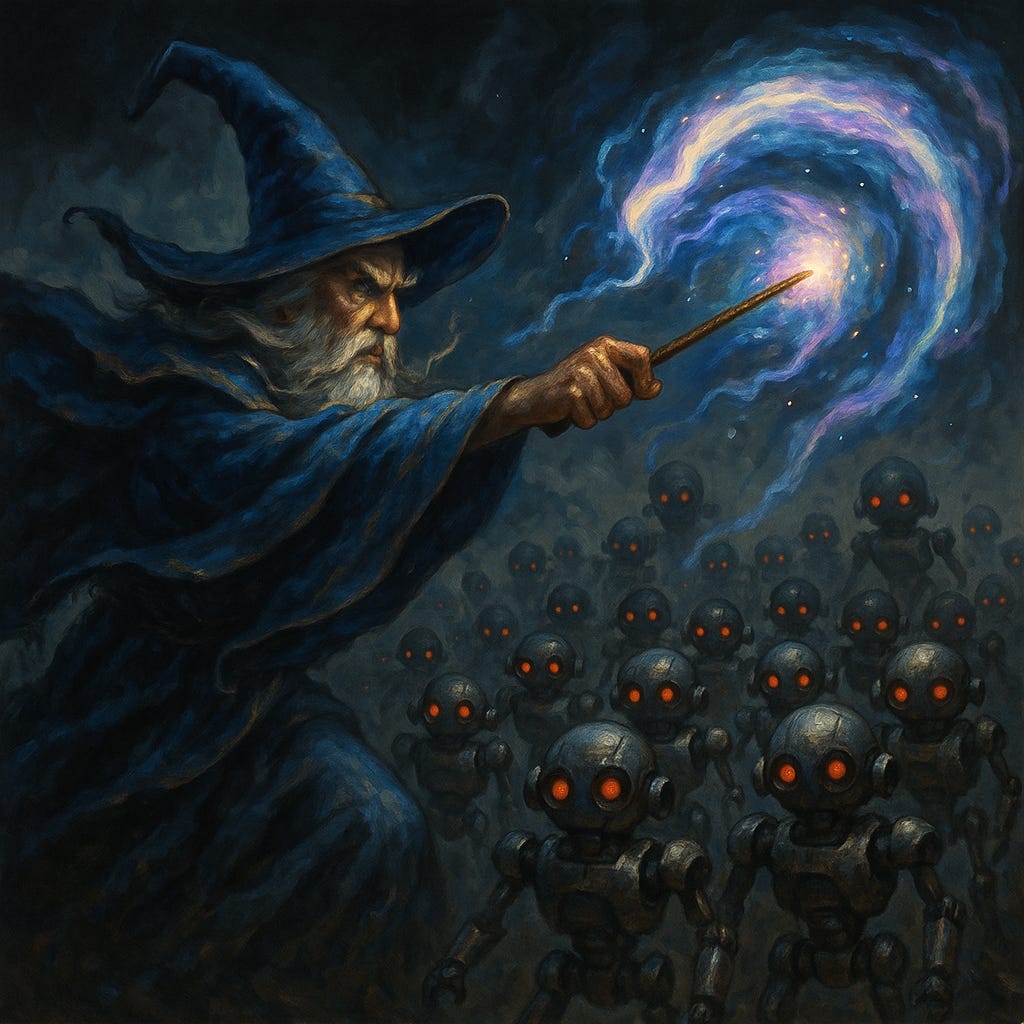Beyond Vibe Coding: Identity, Intelligence, and the Art of Spell Casting with AI
A conversation with Parth Patil on the abundance of intelligence, managing AI fleets, and why your future kids will think you're ancient
The Bottom Line Up Front
We're living through a singularity where intelligence has become abundant, work is shifting from income-based to identity-based, and the future belongs to those who can ask the right questions rather than memorize the right answers. The key insight? We're not just using AI tools—we're becoming conductors of AI orchestras, and the music we create depends entirely on our curiosity, vocabulary, and willingness to play.
Work as Identity: When Intelligence Becomes Abundant
When I asked Parth Patil whether generative AI is accelerating us toward a world where work becomes more about identity than income, his response cut straight to the heart of our current moment.
"I think identity is way more important," he explained. "If you had to choose, I would rather have a high intrinsic motivation to learn something than the money. Because you can't just turn money directly into effort."
Parth calls this phenomenon the "abundance of intelligence"—a world where synthetic cognition isn't bound by human career constraints. The best engineers might not work on solving problems for farmers in rural India because the economics don't make sense. But an AI engineer? It doesn't have career aspirations or salary requirements.
This fundamentally changes everything. Problems that remained unsolved due to economic incentives—not lack of capability—suddenly become solvable. The bottleneck shifts from "Can we afford the talent?" to "Can we ask the right questions?"
The Art of Spell Casting: Why Vocabulary Matters More Than Ever
One of the most fascinating insights from our conversation was Parth's framing of AI interaction as "spell casting." It's not just a clever metaphor—it's a practical framework for understanding why some people get dramatically better results from AI tools.
"I think of it also like spell casting," Parth explained. "How many spells do you have in your arsenal? If you know more words, more games, more whatever, you can trigger these capabilities of the model more efficiently."
Take his example of the word "geoguess." Instead of typing "identify the location of this image from the image," you can simply say "geoguess this" to a language model, and it immediately understands you're referencing the popular geography game. The model's general knowledge becomes accessible through precise vocabulary.
"People are like, prompt engineering is not going to be a thing. But maybe you have to think about prompt engineering as not just how you talk to the model, but how you bring any context into the model."
This includes:
Visual context: Sharing your screen so the AI can see what you're working on
Voice input: Speaking for a minute provides far more context than typing for a minute
Multimodal integration: Combining text, images, audio, and real-time data
The takeaway? Expanding your vocabulary isn't just about communication—it's about unlocking more capabilities from AI systems. Like Hermione in Harry Potter, the person with the most spells in their arsenal becomes the most powerful.
Managing AI Fleets: From Single Player to Orchestra Conductor
Perhaps the most mind-bending part of our conversation was Parth's description of managing multiple AI agents simultaneously. He runs six Claude instances working on different projects, each with their own sandboxes and specific tasks.
"I'll have like six Claudes working at the same time. This is your project. Your job is to work on my website. This is your project. Your job is to work on this brand new framework."
The coordination challenge reminded him of Age of Empires—managing hundreds of units with different specialties, all working toward common objectives. But here's the key insight: the tools for managing AI teams already exist. They're called GitHub and version control.
"How do human programmers collaborate on the same project without undoing progress and breaking each other's work? They use GitHub," Parth explained. "Coding copilots using GitHub solves a large part of this coordination problem."
This isn't just about coding. We're developing new skills as managers of synthetic intelligence, learning when to use "YOLO mode" (letting AI work autonomously) versus when to require approval for every decision.
The rule of thumb? If the cost of error is low and easily reversible, go fast. If the cost is high, maintain human oversight.
The John Henry Moment: Expansion vs. Exhaustion
Parth shared a deeply personal story about experiencing what he calls a "John Henry moment"—the folk tale of the steel-driving man who beat a steam engine in a race but died of exhaustion. When GPT-4 demonstrated it could do data analysis better than him, panic set in.
"I had an anxiety attack. I was like, man, this AI can do my job way better than me. I thought data analysis was my moat."
Keep reading with a 7-day free trial
Subscribe to Don Allen's Substack to keep reading this post and get 7 days of free access to the full post archives.




